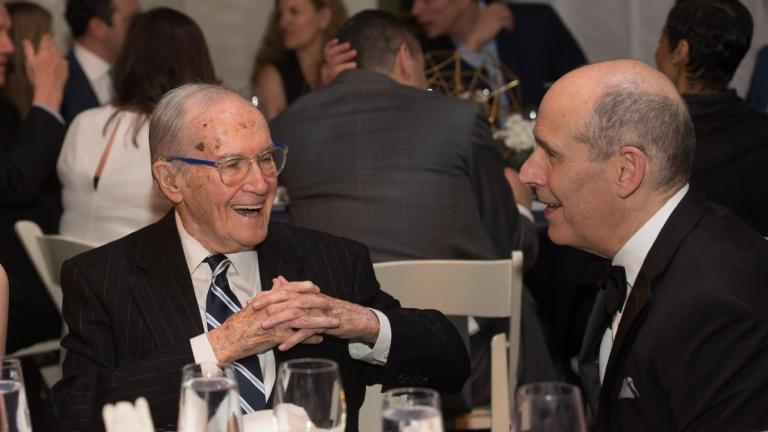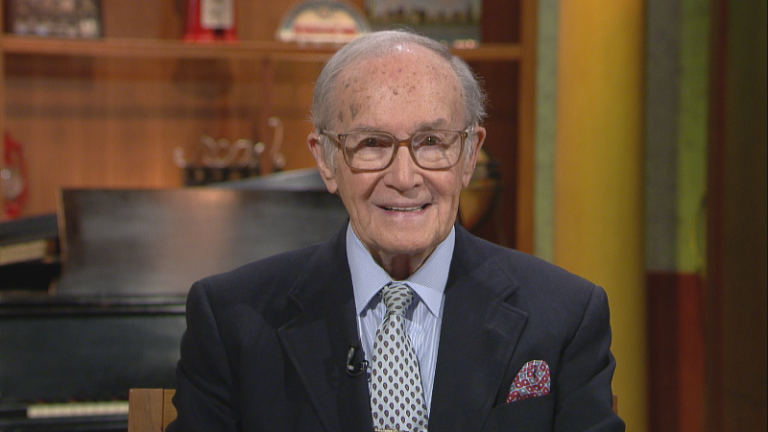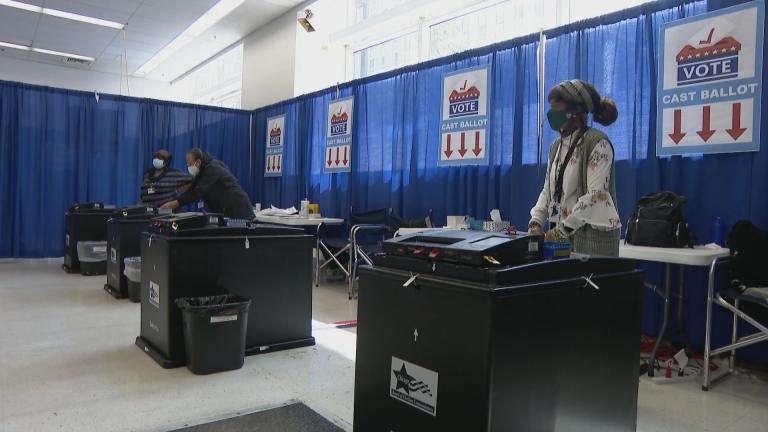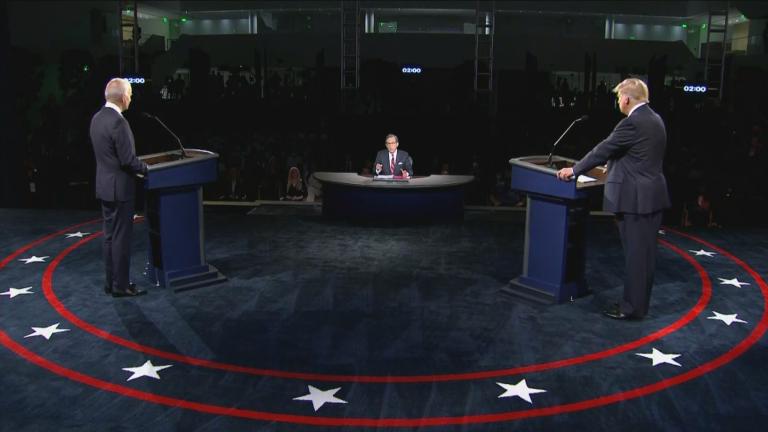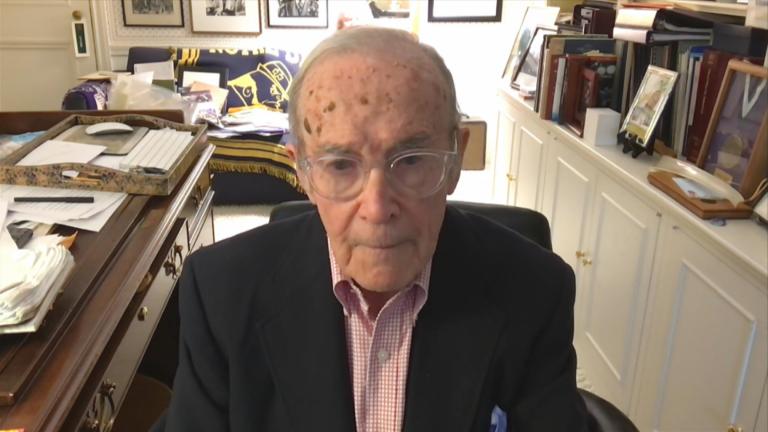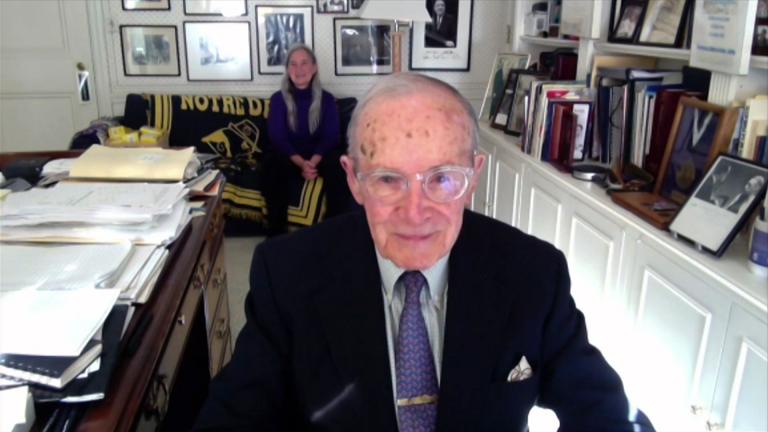Newton Minow may have done more to improve the quality of television in the United States than any other person.
He served as chairman of the Federal Communications Commission from 1961 to 1963 under President John F. Kennedy, and had a hand in the creation of PBS, the expansion of WTTW and nearly every presidential debate since 1960.
“I can assure you that what you will observe is a vast wasteland ...”
Minow, who died on Saturday at age 97, will be forever remembered for those words — spoken to television executives in 1961 when he led the FCC.
Minow wanted the industry to use precious public airwaves for good — not just to make money.
“I saw using this medium certainly for entertainment, but also for education in the large sense, for stimulation, for ... I would hope, inspiration,” he said.
His entire life’s work was devoted to strengthening the institutions of American democracy. And his own life story was a quintessentially American story.
Read More
- Newton Minow, Former FCC Chairman Who Paved the Way for Public Television and WTTW, Dies at 97
- Newton Minow’s Daughters Reflect on Father’s Legacy: ‘He Had a Wonderful, Meaningful Life’
- Newton Minow: An American Story
Born to Jewish immigrants in Milwaukee, Minow served in the Army and became the first in his family to graduate college, going on to earn a law degree from Northwestern University.
That’s where he met his future wife of more than 70 years, Josephine.
Minow worked on the two presidential campaigns of Illinois Gov. Adlai Stevenson before signing onto John F.Kennedy’s 1960 bid.
He later told WTTW News’ Phil Ponce that meeting Kennedy was like love at first site.
“He had a marvelous, quick sense of humor, great wit, apart from charm, he had a first class intellect,” Minow said.
Kennedy tapped Minow for the FCC where he gave his famed speech that exhorted television executives to do better. It led to the passage of laws to expand all television sets to receive UHF signals, as well as to the launch of the first ever communications satellites.
“I said, Mr. President, communications satellites are more important than sending man into space. Communications satellites will send ideas into space,” Minow recalled. “Ideas last longer than people.”
Under Minow’s tenure, Congress appropriated funds for public television and PBS was eventually born.
Video: Joining “Chicago Tonight” to discuss Newt Minow’s legacy are former “Chicago Tonight” contributor Carol Marin, former “Chicago Tonight” host Phil Ponce and Chris Abbinante, a partner at Sidley Austin. (Produced by Andrea Guthmann)
In 1967, a fledgling educational television station in Chicago called on Minow — who was by that time in private law practice — to become chairman of its board of trustees. He and Josephine were active in supporting WTTW from its birth.
“My wife went door to door in the neighborhood and asked for a $5 or $10 contribution which went to WTTW, which got us established and ready to broadcast,” he said.
Under Minow’s guidance, WTTW became the most watched public TV station in the country and paved the way for programs like “Chicago Tonight” and “Week in Review.”
Minow remained a longtime station trustee.
He also had a successful private law practice and famously hired a young community organizer just out of law school named Barack Obama.
Obama has said he owes Minow a great debt, particularly because Minow helped introduce him to another young law clerk named Michelle Robinson — who he of course later married.
Minow was also an early supporter of Obama’s presidential campaign, believing the young candidate reminded him of the president he served under.
“He’s got a first class mind and a first class temperament,” Minow said of Obama.
Minow was also a driving force in the creation of televised presidential debates. Starting with the infamous Kennedy-Nixon debate in 1960, he has been involved in every presidential debate since then.
“I trust the American people to evaluate that person and make a judgement on whether or not they want to vote for them,” he said of his work with the Commission on Presidential Debates.
In 2016, Minow was awarded the Presidential Medal of Freedom.
He is survived by his three daughters, Nell, Martha and Mary.

